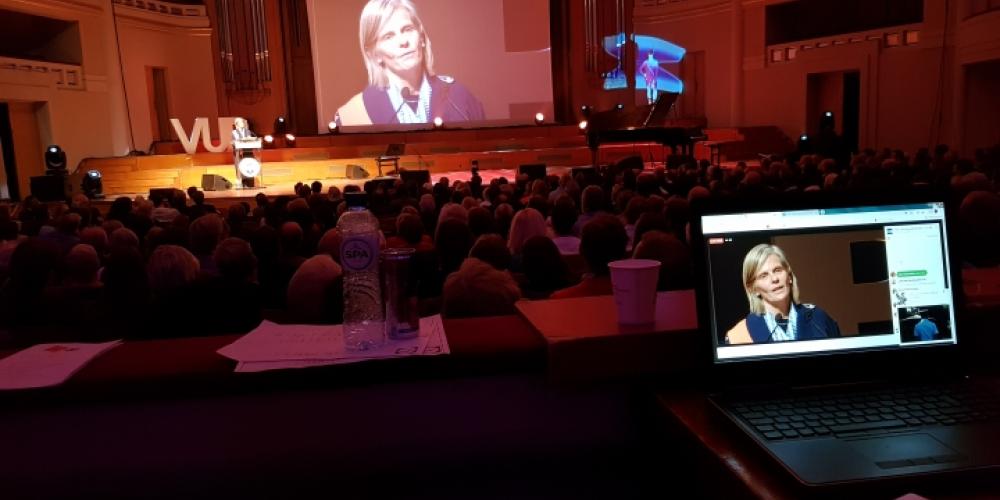
Beauty, but also power and wisdom
Officially the academic opening ceremony was held under the banner ‘The beauty of science’. But it could just as well have been the power or the wisdom of science. Because Pauwels elaborated on the three characteristics. More so: it is this trinity that renders science so indispensable. A position she further built upon based on - again - three books that left an impression on her: a biography of Leonardo Da Vinci by the hand of Walter Isaacson, ‘Factfulness’ by the recently deceased Swedish physician and statistician Hans Rosling, and ‘Homo Deus’ by the very popular Israeli historian Yuval Noah Harari.
A little bit of Da Vinci in every scientist
Leonardo Da Vinci possessed a triple gift, she claimed: He was constantly amazed. He could observe in concentration. And he had a boundless imagination. All characteristics every passionate scientist should show, according to Pauwels. They make a sanctuary out of science. Unfortunately a sanctuary that is in peril, ‘of populistic leaders that label scientific insights that are inconvenient to them as fake, of religious leaders that state we don’t need new knowledge, and of economic forces and market logics, that only want research that is useful, science that renders a profit’. Precisely why every scientist should be a little bit like Leonardo, she concluded.
Possibilism, as practised by VUB scientists
Once she established that fortunately there are still such scientists, Pauwels switched to what she called the power of science: the possibility to make the world effectively a better place for everyone. Hans Rosling’s merit is that he actually proved that, by presenting various data sets in a transparent and visually aesthetic way and in doing so making it clear to everyone that science actually does create exceptional improvements: from 50% of the world population that lived in extreme poverty fifty years ago to only 9% now. An adept of ‘possibilism’ the rector qualified Rosling: referring to the conviction that the world can be improved by knowledge and science. There are plenty of ‘possibilists’ at VUB, Pauwels noted: people like Kris Thielemans, Bart Neyns and Damya Laoui with their research into cancer and immunotherapy, or the team of Bram Vanderborght and its research into ‘cyberlegs’.
Excellent, relevant and wise research and education
Science can be beautiful, science has the power to change the world. But therein also lies a danger: the danger that we will outpace ourselves, or that we no longer have control over the changes we have set in motion. Even now we create systems that know us better than we know ourselves, that can play chess better than us, the can think better. We have become ‘homo deus’, said Pauwels, referring to the third book that had inspired her speech. Yet we must have the wisdom to deal with those godly gifts we gave ourselves. And that wisdom is also inherent to the science that tells us not to take anything for granted and the wisdom to remind us that science first of all should have the ambition to make society and the world a little better. It is that same science that should deter us from ‘the temptation of large funding streams in times of output and performance indicators’, according to Pauwels. And that render us vulnerable to so-called ‘predator journals that offer fake publications at a price’. It is exactly in that assignment where the value of a university like VUB lies: providing education and research that are excellent in depth and relevant in width. ‘Fundamental, strategic, applied and translational research are all intrinsically linked’, Pauwels summarised.
Hope. If there is one word that sums up the rector’s speech at the start of the new academic year, it is hope. Hope for science, it beauty, its power and its wisdom. But also: hope for our world, that we will have to make due with and that we should cherish. We must show ‘amor mundi’, with which Pauwels cited her favourite philosopher Hannah Arendt. Amor mundi and science. They are the only things we have to stave of the darkness. After which the rector concluded her speech coming full circle with the motto of her university: scientia vincere tenebras.